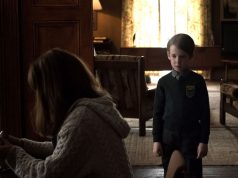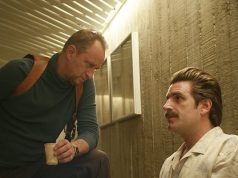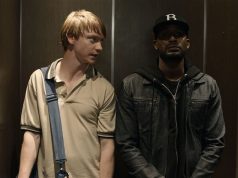Danny Boyle might be the most unpredictable director currently working. Where other young filmmakers tend to have a particular tone to their work — you can always tell a Wes Anderson movie, for example, or a Coen Brothers effort — Boyle’s films thus far have been wildly divergent in content and theme, unified only by Boyle’s consistently original use of the camera.
From the horrific portrait of drug addiction in “Trainspotting” to the surreal paradise in “The Beach” to the high-speed zombie flick “28 Days Later,” Boyle has shown a remarkable eye for composing a shot, for keep things interesting not just in the story department (though he is always cognizant of that element’s prime importance) but in the way the movie looks, too.
Now comes “Millions,” an imaginative, uplifting modern fable about two young boys who find a huge bag of cash and disagree on what to do with it. The story is straightforward but highly compelling, the unusual situation leading naturally to complications, dilemmas and clever, even subversive comedy as they boys discover what life is like when you have a lot of spare money lying around. But as always, Boyle is not content to merely charm us with a fantastic story and likable performances. He also includes a time-lapse sequence showing the boys’ new house being built; a tracking shot of the house’s second story shot from the rafters and following one of the lads from room to room; and a great moment where the camera pulls back from the boy’s face as he stands alone in the schoolyard to reveal all the other children laughing and playing, the boy looking more isolated the more the camera moves away from him.
The two boys are Damian (Alexander Nathan Etel) and his older brother Anthony (Lewis Owen McGibbon), good lads whose mother has recently died, leading them and their father Ronnie (James Nesbitt) to move to a brand-new tract home in the suburbs. Mom’s death was recent, we gather, but the boys have bounced back quickly, now using the fact of her death primarily as a means of getting free candy from sympathetic shop owners. Dad, we note in a subtle touch, still sleeps with two pillows approximating the form of his late wife.
Damian has a thing for the Christian saints and martyrs, and he is often visited by them (or perhaps only by his imagination of them), receiving guidance and suggestions as he goes about his daily life. His odd visions and lack of enthusiasm for professional soccer make him a bit of an outcast at school, which makes visits from the saints more necessary to his morale, which makes him more of an outcast. It’s a vicious cycle, seeing dead people.
One day while playing in a field near the housing tract, Damian is surprised when a duffel bag full of money lands on him. He has no idea where it came from. He shows Anthony immediately, and the two count the cash: 229,520 pounds. But England is switching to the Euro in two weeks, at which point the currency will become useless. Spend it, change it or bank it by Christmas. What are two boys to do?
Anthony wants to spend it. He begins flashing just enough cash at school to imply his wealth, and hires an entourage of fawning students to accompany him everywhere. Damian, meanwhile, having been encouraged by St. Francis of Assisi, wants to give it to the poor. Told there are no poor in the suburbs, he has to look harder.
The boys exist for a while in this sort of fantasy world, where money truly does just drop from the sky, before reality sets in and the money’s origin is discovered. Anthony never did believe it was from God — “Not really His thing, is it, handing out cash?” says their father when he is finally brought into the loop — but Damian, a boy of faith and innocence, did. Does the money’s true, illicit origin lessen its potential to do good?
The actors playing the boys are perfect for their roles, because they do not seem like child actors but like real people who happen to be children. This is exactly what the film needs, for the film, while suitable for older children (say, 10 and up, with parental guidance), does not condescend to them as 98 percent of all “kids’ movies” do. It gives the audience credit for being smart, and is at least as delightful for adults as it is for young viewers.
Frank Cottrell Boyce, a frequent screenwriter for Michael Winterbottom’s films, has crafted a fine screenplay, brought whimsically to life by Boyle’s energetic, humanistic direction. The two seem a perfect fit: Boyce’s “what if?” stories, Boyle’s filmmaking savvy and keen eye for detail. The fact that the director of “Trainspotting” and “28 Days Later” can make something from a child’s perspective, something as sweet, wonderful and nearly perfect as “Millions,” is reason enough to believe in miracles.
A- (1 hr., 37 min.; )





